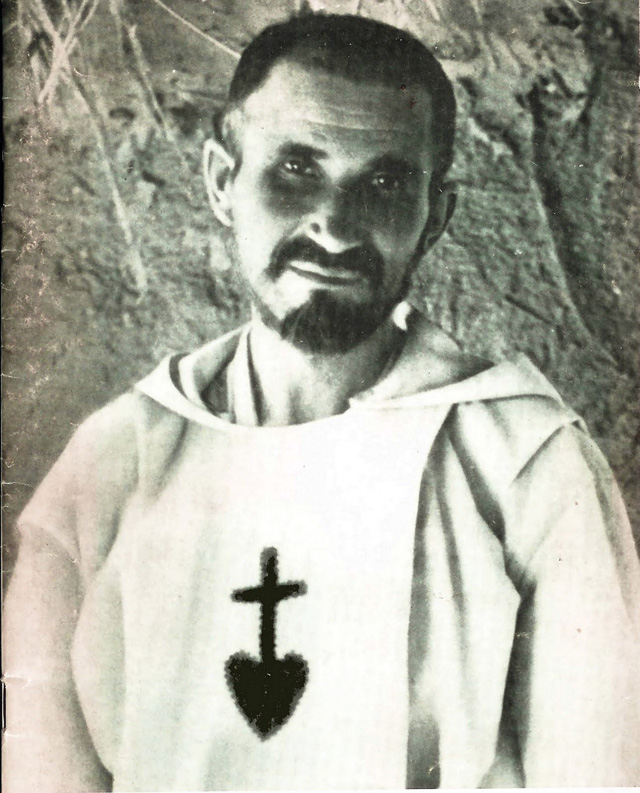Universal Brother
The call of Blessed Charles de Foucauld
By Fr. Ron MacDonell, S.F.M.
March/April 2012
Return to Table of Contents
Print Article
A few years ago, I made my annual personal retreat at the Benedictine Sisters’ Monastery of Living Water near the city of Itacoatiara in Brazil’s Amazon region. On my first day there I discovered several books on the life and mission of Fr. Charles de Foucauld in the monastery’s small library. I had heard of Fr. Charles before, but I ended up spending my whole retreat week learning from and praying with my “universal brother.” I now realize that this was not just happenstance, but the work of the Holy Spirit.
Born in France in 1858, Charles de Foucauld served as a young man in the French army in Algeria. There he felt drawn to the solitude of the Saharan desert. At the age of 28, Charles underwent a deep conversion experience in his native France. He became a Trappist monk, living first in France and then in Syria. Yearning for an even more radical poverty, he left the monastery to live in a hovel near the convent of the Poor Clares in Nazareth. He served as the sisters’ handyman for three years, immersing himself in the spirit of the place where Jesus grew up. Then, when he was 43 years old, he answered a call to the priesthood and went to witness Christ among the Tuareg people of the southern Sahara. But Charles did not go there to convert this people of Muslim faith to Christianity. Rather, he felt profoundly called to be simply a brother to them.
Charles lived in a plain mud hut for many years among the Tuaregs and others of the area, offering kindness and hospitality to all who came his way. He came to understand that when we opt to follow Jesus, we become brother and sister to everyone, the whole human family.
“Our hearts, like that of the Church, like that of Jesus, must embrace all humanity,” he wrote. Charles saw himself as a universal brother: “I want all the people here, Christians, Muslims, Jews, non-believers, to look on me as their brother, their universal brother. They begin to call my house ‘the fraternity’ and this makes me happy.” Even though he was a priest, Charles wished to be known as Brother Charles, a universal brother to all.
Brother Charles’s life among the Tuareg in the Sahara was imbued with a theology later articulated in 1965 at Vatican II:
...other religions which are found throughout the world attempt in their own way to calm the hearts of men by outlining a program of life covering doctrine, moral precepts and scared rites.
The Catholic Church rejects nothing of what is true and holy in these religions. She has a high regard for the manner of life and conduct, the precepts and doctrines which, although differing in many ways from her own teaching, nevertheless often reflect a ray of that truth which enlightens all men. Yet she proclaims and is in duty bound to proclaim without fail, Christ who is the way, the truth and the life (John 1:6). In him, in whom God reconciled all things to himself (2 Corinthians 5:18-19), men find the fullness of their religious life.
The Church, therefore, urges her sons to enter with prudence and charity into discussion and collaboration with members of other religions. Let Christians, while witnessing to their own faith and way of life, acknowledge, preserve and encourage the spiritual and moral truths found among non-Christians, also their social life and culture.
(Declaration on the Relation of the Church to Non-Christian Religions, #2, Vatican Council II)
Charles befriended his Tuareg brothers and sisters with “prudence and charity.” He learned their language and laboured 10 years elaborating a Tuareg-French dictionary and a grammar of Tuareg, as well as docu-menting traditional stories and songs. He was their friend, their universal brother.
On December 1, 1916, Charles de Foucauld was shot dead by marauding bandits. After his martyrdom, the witness of Brother Charles inspired the founding of the Little Brothers of Jesus and the Little Sisters of Jesus, as well as several other groups. His spirituality is most powerfully represented in his Prayer of Abandonment. We are called to abandon ourselves totally to God’s will: unless the seed dies, it cannot bear fruit. “Above all,” Brother Charles says, “always see Jesus in every person, and consequently treat each one not only as an equal and as a brother or sister, but also with great humility, respect and selfless generosity.”
Fr. Charles’s respect for the Tuareg people’s social life and culture, and his work on their language, did not go unnoticed. Two years after the close of the Second Vatican Council, Fr. Charles was mentioned by Pope Paul in his 1967 encyclical Populorum Progressio (On the Development of Peoples) as a model of enculturation in mission:
...The missionaries sometimes intermingled the thought patterns and behavior patterns of their native land with the authentic message of Christ. Yet, for all this, they did protect and promote indigenous institutions; and many of them pioneered in promoting the country’s material and cultural progress.
We need only mention the efforts of Père Charles de Foucauld: he compiled a valuable dictionary of the Tuareg language, and his charity won him the title, “everyone’s brother.” So We deem it fitting to praise those oft forgotten pioneers who were motivated by love for Christ, just as We honor their imitators and successors who today continue to put themselves at the generous and unselfish service of those to whom they preach the Gospel.
(Populorum Progressio, #12)
Fr. Charles de Foucauld was beatified on November 13, 2005, by Pope Benedict XVI. He continues to be an inspiration for many who live among peoples of other faith and who yearn to be a universal brother or a universal sister. Blessed Brother Charles, pray for us.
Fr. Ron MacDonell is a Scarboro Missions priest and linguist working in Brazil’s Amazon region with indigenous peoples. He is a member of Jesus Caritas, a fraternity of priests who follow Blessed Charles de Foucauld’s spirituality (www.jesuscaritas.info).Prayer of Abandonment
Father,
I abandon myself into your hands;
do with me what you will.
Whatever you may do, I thank you:
I am ready for all, I accept all.
Let only your will be done in me,
and in all Your creatures—
I wish no more than this, O Lord.
Into your hands I commend my soul:
I offer it to you with all the love of my heart,
for I love you Lord, and so need to give myself,
to surrender myself into your hands, without reserve,
and with boundless confidence,
For you are my Father.
Charles de Foucauld (1858-1916)
Return to Table of Contents
Print Article

